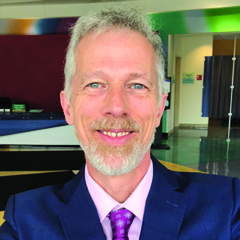
Mathematica welcomes Paul Shattuck as a senior fellow in the Health Unit. Shattuck is a nationally recognized expert in autism spectrum disorders, and he pioneered the understanding of autism in adulthood and the measurement of autism outcomes. Shattuck’s other research interests include social determinants of health and access to health and social services for children with special health care needs. At Mathematica, Shattuck will help forge deeper connections between our disability and Medicaid work, collaborate with foundations on autism and disability research, and help translate scientific findings into useful evidence-based guidance for policy and practice in his fields of expertise.
Shattuck comes to Mathematica from Drexel University, where he was the founding leader of the A.J. Drexel Autism Institute’s Life Course Outcomes Program. He oversaw an integrated strategy for conducting, translating, and disseminating research to improve community-based services and inform national policies aimed at helping teens and adults on the autism spectrum. This work included founding the National Autism Data Center and the pioneering series of National Autism Indicators Reports about national and state statistics on autism. In addition, he created the Transition Pathways Community Partnership Initiative, a community-based innovation incubator creating opportunities for work, learning, and community participation among inner-city youth on the autism spectrum. Before his academic career, Shattuck worked in social services doing tenant organizing, developing affordable housing, and designing programs for vulnerable populations—including homeless youth and families, migrant farmworkers, preschool children, and incarcerated men.
“We are delighted to welcome Paul to our team,” said Erin Taylor, senior vice president and managing director of health policy assessment. “His groundbreaking work in the field of autism research and his commitment to using evidence-based technical assistance in community programs will help us move the policy needle and improve the lives of people with disabilities.”
Widely published in peer-reviewed journals, Shattuck has delivered briefings for members of Congress, has keynoted at major conferences, and, most recently, became a member of The Lancet’s Commission on Autism. He is a member of the International Society for Autism Research and the Society for Social Work Research and holds a Ph.D. in social welfare and an M.S.W. from the University of Wisconsin-Madison.
